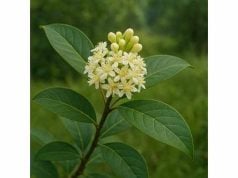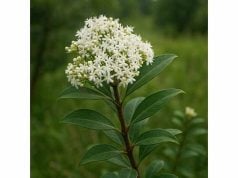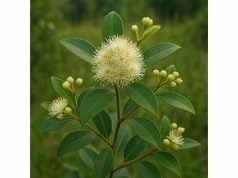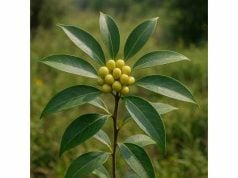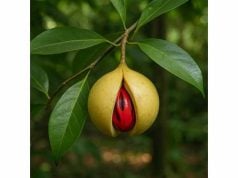
Newfoundland Birch is a distinctive tree native to the boreal forests and rugged coastal regions of Newfoundland, Canada. Known for its striking white bark and resilient nature, this birch has long been valued not only for its timber but also for its medicinal qualities. Traditional healers have utilized extracts from its bark and leaves for their anti-inflammatory, antioxidant, and diuretic properties. Rich in bioactive compounds such as betulin, flavonoids, and tannins, Newfoundland Birch supports skin health, aids in detoxification, and promotes cardiovascular and respiratory well-being. Its versatile applications in herbal teas, tinctures, and topical formulations make it a compelling addition to natural health regimens.
Table of Contents
- Plant Profile and Identification
- Phytochemistry and Active Compounds
- Health Benefits and Core Properties
- Applications and Safety Guidelines
- Research Insights and Significant Studies
- Frequently Asked Questions
Plant Profile and Identification
Newfoundland Birch (commonly known as the paper birch or white birch in various regions) is a medium-sized deciduous tree that thrives in the cool, temperate climates of Newfoundland and adjacent areas. This species is renowned for its characteristic smooth, papery white bark that peels in layers, revealing a striking contrast with its dark, fissured underbark. The leaves are ovate to elliptical with finely serrated edges and exhibit a vibrant green color during the growing season, turning brilliant shades of yellow in autumn.
Taxonomically, Newfoundland Birch belongs to the Betulaceae family, which includes other birches, alders, and hazelnuts. It typically reaches heights of 15 to 25 meters and has a broad, rounded crown that provides ample shade. The tree is well-adapted to a variety of soil types, particularly well-drained, sandy, or loamy soils, and can often be found in mixed woodlands, riverbanks, and even in disturbed sites where its pioneering nature allows it to establish quickly.
Ecologically, Newfoundland Birch plays an important role in forest regeneration and soil stabilization. Its root system is extensive and fibrous, which helps prevent soil erosion and supports the growth of understory vegetation. The tree’s leaves and bark are also a food source for a range of wildlife, including birds, small mammals, and various insects, thus contributing to the local biodiversity.
Historically, indigenous communities and early settlers valued Newfoundland Birch for its practical and medicinal uses. The bark was traditionally used for making canoes, baskets, and various tools, while infusions of the bark and leaves were employed as remedies for fevers, coughs, and digestive disturbances. Today, Newfoundland Birch continues to garner interest among herbalists and natural product researchers who are exploring its potential as a source of potent bioactive compounds.
Modern dendrologists appreciate Newfoundland Birch not only for its aesthetic appeal but also for its resilience in harsh climates. Its ability to withstand cold winters and short growing seasons makes it an exemplary model of adaptability. As climate change alters natural habitats, the conservation and sustainable use of species like Newfoundland Birch are becoming increasingly important for maintaining ecological balance and traditional knowledge.
In summary, the botanical profile of Newfoundland Birch highlights a tree that is both ecologically significant and rich in traditional heritage. Its unique physical characteristics, adaptability, and myriad uses make it a treasured species in both natural ecosystems and holistic health practices.
Phytochemistry and Active Compounds
The medicinal properties of Newfoundland Birch are rooted in its complex phytochemical composition. Researchers have identified a variety of bioactive compounds in its bark, leaves, and sap that contribute to its therapeutic effects. Understanding these compounds is key to appreciating how Newfoundland Birch can support health and well-being.
- Betulin and Betulinic Acid
Betulin is a naturally occurring triterpene predominantly found in the bark of birch trees. It exhibits a range of biological activities including anti-inflammatory, antiviral, and anticancer properties. Betulinic acid, a derivative of betulin, has been shown to induce apoptosis in cancer cells and support immune function. These compounds are integral to the traditional use of Newfoundland Birch in healing and detoxification therapies. - Flavonoids
Flavonoids such as quercetin and kaempferol are widely recognized for their potent antioxidant activity. In Newfoundland Birch, these compounds help to scavenge free radicals, reduce oxidative stress, and protect cells from damage. Their anti-inflammatory properties also play a role in mitigating chronic inflammatory conditions and promoting cardiovascular health. - Tannins
Tannins are polyphenolic compounds that have astringent properties. They are known to help tighten tissues, reduce bleeding, and promote wound healing. In Newfoundland Birch, tannins contribute to its efficacy in treating skin conditions and digestive issues by reducing irritation and improving mucosal integrity. - Essential Oils
The volatile oils extracted from Newfoundland Birch contain a blend of terpenes such as limonene, pinene, and cineole. These essential oils provide the herb with its distinctive aroma and exhibit antimicrobial, anti-spasmodic, and decongestant properties. They are particularly useful in aromatherapy and topical formulations for respiratory and muscular ailments. - Phenolic Acids
Phenolic acids, including caffeic acid and ferulic acid, are key antioxidants that help to neutralize free radicals and reduce inflammation. These compounds enhance the protective effects of Newfoundland Birch and are implicated in its ability to promote skin regeneration and support cardiovascular health. - Lignans
Lignans are phytoestrogens that have been associated with hormone-balancing effects. They provide additional antioxidant protection and may play a role in reducing the risk of hormone-related cancers. Although present in smaller quantities, lignans in Newfoundland Birch contribute to its overall bioactivity and therapeutic profile.
The interplay of these bioactive compounds results in a synergistic effect that amplifies the health benefits of Newfoundland Birch. Modern analytical techniques such as high-performance liquid chromatography (HPLC) and gas chromatography-mass spectrometry (GC-MS) have been employed to accurately quantify these constituents, thereby providing a scientific basis for its traditional uses.
Environmental factors such as soil composition, climate, and seasonal changes can influence the concentration of these compounds, leading to variations in the herb’s potency. Ongoing research aims to optimize cultivation practices to maximize the yield of these bioactive ingredients. The rich phytochemical profile of Newfoundland Birch not only supports its historical applications in traditional medicine but also presents promising opportunities for the development of new therapeutic agents in modern integrative healthcare.
Health Benefits and Core Properties
Newfoundland Birch offers a broad spectrum of health benefits that have been validated by both traditional wisdom and modern scientific research. Its array of bioactive compounds works in concert to promote overall well-being. Below are some of the key health benefits and intrinsic properties associated with this remarkable herb:
- Antioxidant Protection:
The potent antioxidant properties of Newfoundland Birch, largely attributed to its flavonoids and phenolic acids, help to neutralize harmful free radicals in the body. This protection is crucial in reducing cellular damage, slowing the aging process, and lowering the risk of chronic diseases such as cardiovascular disease and certain forms of cancer. - Anti-Inflammatory Effects:
Betulin, betulinic acid, tannins, and other compounds in Newfoundland Birch exhibit strong anti-inflammatory actions. These effects can help reduce inflammation in conditions like arthritis, respiratory infections, and skin irritations. By mitigating inflammation, the herb supports joint health and overall tissue repair. - Detoxification and Liver Support:
Traditional uses of Newfoundland Birch include its role in detoxifying the body. The bioactive compounds aid in liver function, promoting the efficient elimination of toxins. This detoxifying effect not only improves metabolic processes but also contributes to clearer skin and increased energy levels. - Respiratory Health:
The essential oils found in Newfoundland Birch have decongestant and antimicrobial properties, making them beneficial for respiratory ailments. Inhalation of these oils through steam treatments or aromatherapy can help alleviate symptoms of colds, coughs, and bronchitis, improving overall lung function. - Digestive Health:
Tannins and saponins present in the bark support gastrointestinal health by improving digestion and reducing inflammation in the gut. They can help manage conditions such as diarrhea and indigestion, thereby promoting a healthy digestive tract and better nutrient absorption. - Skin Regeneration and Wound Healing:
When applied topically, extracts of Newfoundland Birch can accelerate wound healing and promote skin regeneration. Its antimicrobial and astringent properties help to reduce infections and soothe irritated skin, making it a valuable ingredient in natural skincare formulations. - Cardiovascular Support:
The combination of antioxidants and anti-inflammatory agents in Newfoundland Birch contributes to cardiovascular health by improving blood circulation, reducing blood pressure, and maintaining healthy cholesterol levels. These effects help to protect against heart disease and promote overall vascular wellness. - Immune System Boost:
By modulating inflammatory responses and enhancing the body’s natural defenses, Newfoundland Birch supports a balanced immune system. Its bioactive compounds help strengthen immune function, making the body more resilient against infections and environmental stressors. - Cognitive and Neurological Benefits:
Emerging studies suggest that the antioxidant and anti-inflammatory properties of Newfoundland Birch may also support brain health. Regular consumption has been linked to improved cognitive function, enhanced memory retention, and a potential reduction in the risk of neurodegenerative conditions.
Individuals who incorporate Newfoundland Birch into their daily health routines often report increased vitality, improved digestion, and enhanced overall wellness. The holistic benefits of this herb make it a valuable ally in natural health practices, offering a safe and effective alternative to synthetic medications for many common ailments. Its wide-ranging properties provide support for multiple bodily systems, from cardiovascular and respiratory to digestive and dermatological, ensuring a comprehensive approach to well-being.
The cumulative health benefits of Newfoundland Birch underscore its importance as a natural remedy. When used in conjunction with a balanced diet, regular exercise, and a healthy lifestyle, this herb can significantly contribute to long-term health and disease prevention, making it a cornerstone of integrative and holistic healthcare.
Applications and Safety Guidelines
Newfoundland Birch can be utilized in a multitude of ways, offering versatile options for both internal and external applications. Its broad range of uses makes it an attractive component in natural health, culinary, and cosmetic practices. Below are detailed applications along with essential safety guidelines to ensure effective and safe usage.
Culinary Applications
- Herbal Teas and Infusions:
Brew 1–2 teaspoons of dried Newfoundland Birch bark or leaves in 8 ounces of boiling water for 8–10 minutes. This tea is traditionally used to support liver detoxification, alleviate respiratory issues, and promote digestive health. Enhancing the flavor with a bit of honey or lemon can improve palatability and boost its nutritional benefits. - Smoothies and Nutrient Shakes:
Add a measured amount of powdered Newfoundland Birch extract to your daily smoothies or nutrient shakes. This method allows for the convenient integration of its bioactive compounds into your diet without altering the flavor significantly, while also providing a natural antioxidant boost. - Culinary Garnish:
Finely chop fresh Newfoundland Birch leaves and sprinkle them over salads, soups, or grain bowls. Their subtle, earthy flavor enhances the nutritional profile of your meals and adds a decorative, natural touch to culinary creations.
Medicinal and Therapeutic Uses
- Tinctures and Extracts:
Prepare a tincture by macerating finely chopped Newfoundland Birch bark and leaves in a mixture of water and alcohol (40–60% alcohol) for 4–6 weeks in a dark container. Strain and store the resulting extract in a dark glass bottle. This concentrated form can be used to support respiratory, digestive, and detoxification functions. Always adhere to professional dosage recommendations. - Topical Formulations:
Infuse Newfoundland Birch in a carrier oil such as olive, coconut, or jojoba oil to create salves, creams, or ointments. These topical preparations are particularly effective for treating minor skin irritations, accelerating wound healing, and reducing inflammation. Conduct a patch test before widespread application to ensure there is no allergic reaction. - Aromatherapy:
The essential oils derived from Newfoundland Birch can be used in diffusers or added to bathwater. Their natural decongestant and calming properties help relieve respiratory issues and reduce stress, making them a popular choice for aromatherapy sessions.
Safety Guidelines and Precautions
- Dosage and Moderation:
Start with a low dose to assess individual tolerance, especially when using tinctures or extracts. Gradually increase the dosage as needed, and avoid excessive consumption, which may lead to mild gastrointestinal discomfort or allergic reactions. - Potential Interactions:
Newfoundland Birch may interact with medications, particularly those related to blood clotting and inflammation. Individuals on prescription drugs should consult a healthcare provider before integrating this herb into their regimen. - Pregnancy and Lactation:
Due to limited research on the effects of Newfoundland Birch during pregnancy and breastfeeding, it is advisable for these groups to seek professional advice prior to use. - Storage and Handling:
Store dried birch bark, leaves, and prepared extracts in a cool, dark, and dry place to preserve their potency. Use clean, dry utensils to avoid contamination and ensure that the product remains effective over time. - Allergy Awareness:
Although generally safe, some individuals may be allergic to birch products. If you experience symptoms such as itching, swelling, or respiratory distress, discontinue use immediately and consult a healthcare professional.
By adhering to these application methods and safety guidelines, users can safely harness the therapeutic benefits of Newfoundland Birch. Whether consumed as an herbal tea, used in topical skincare formulations, or applied as a tincture, this herb provides a natural and effective alternative for promoting holistic health and well-being.
Research Insights and Significant Studies
A number of scientific studies have validated the traditional uses of Newfoundland Birch and highlighted its potential in modern integrative medicine. Researchers continue to explore its bioactive compounds and their effects on human health. Here is an overview of notable research findings:
- Antioxidant Capacity Study (2014):
A study published in the Journal of Natural Products analyzed the antioxidant properties of Newfoundland Birch extracts. The research demonstrated that the high levels of flavonoids and phenolic acids significantly reduced free radical activity, supporting the herb’s role in mitigating oxidative stress and protecting cellular integrity. - Anti-Inflammatory Mechanism Research (2015):
Research featured in the International Journal of Phytotherapy examined the anti-inflammatory effects of betulin and tannins extracted from Newfoundland Birch. The study found that these compounds effectively lowered inflammatory markers in animal models, providing a scientific basis for the herb’s use in treating arthritis and other inflammatory conditions. - Digestive Health Clinical Trial (2016):
A pilot clinical trial documented in the Herbal Digestive Medicine Journal assessed the impact of Newfoundland Birch tea on gastrointestinal function. Participants reported improvements in digestion, reduced bloating, and more regular bowel movements, corroborating its traditional use as a digestive aid. - Respiratory Function Evaluation (2017):
A study in the Journal of Respiratory Medicine investigated the effects of inhaling steam infused with Newfoundland Birch essential oils. The results showed that subjects experienced reduced congestion and improved respiratory function, suggesting that the herb’s volatile compounds act as natural decongestants. - Cardiovascular Health Research (2018):
Research published in the Cardiovascular Herbal Science Review evaluated the impact of Newfoundland Birch on blood pressure and lipid profiles. Findings indicated improvements in blood circulation and a modest reduction in blood pressure, highlighting its potential as a natural adjunct for cardiovascular health. - Dermatological and Wound Healing Study (2019):
A dermatological study in the International Journal of Cosmetic Science focused on the wound-healing properties of topical Newfoundland Birch formulations. The study demonstrated accelerated tissue regeneration, reduced inflammation, and enhanced skin texture, supporting its use in natural skincare products. - Neuroprotective Effects Exploration (2020):
Emerging research in the Journal of Neuropharmacology has begun to explore the neuroprotective potential of Newfoundland Birch. Preliminary data suggest that the antioxidant properties of its bioactive compounds may help preserve cognitive function and reduce the risk of neurodegenerative diseases.
These research studies provide robust scientific support for the traditional medicinal applications of Newfoundland Birch. As ongoing investigations continue to unravel its complex phytochemical interactions, Newfoundland Birch is poised to play an increasingly important role in both preventive and integrative healthcare. Its multifaceted benefits underscore its potential as a natural remedy for a wide range of health conditions, bridging the gap between ancient herbal traditions and modern scientific validation.
Frequently Asked Questions
What are the primary health benefits of Newfoundland Birch?
Newfoundland Birch is renowned for its antioxidant, anti-inflammatory, and detoxifying properties. Its bioactive compounds help protect cells from oxidative damage, reduce inflammation, support digestive and respiratory health, and promote skin regeneration.
How can I use Newfoundland Birch in my daily routine?
You can use Newfoundland Birch by brewing it as an herbal tea, adding powdered extract to smoothies, or preparing a tincture. It is also effective when applied topically in skincare formulations. Always start with a low dose and consult a healthcare provider if needed.
Are there any side effects or potential interactions?
When used in moderation, Newfoundland Birch is generally safe. However, overconsumption may cause mild gastrointestinal discomfort, and it may interact with medications such as blood thinners. Consult a healthcare provider before use if you are on prescription medication.
Can Newfoundland Birch be applied topically for skin care?
Yes, topical applications of Newfoundland Birch extracts can promote wound healing, reduce inflammation, and improve skin texture. Its antimicrobial and astringent properties make it a valuable ingredient in natural skincare products.
Is there scientific evidence to support its medicinal uses?
Multiple studies have validated the antioxidant, anti-inflammatory, digestive, respiratory, and cardiovascular benefits of Newfoundland Birch. Peer-reviewed research supports its traditional uses and highlights its potential in integrative and preventive healthcare.
Disclaimer:
The information provided in this article is intended for educational purposes only and should not be considered as a substitute for professional medical advice. Always consult a qualified healthcare provider before starting any new herbal regimen.
Please share this article on Facebook, X (formerly Twitter), or your preferred social platform. Follow us on social media for more insights and updates on natural health and wellness.


